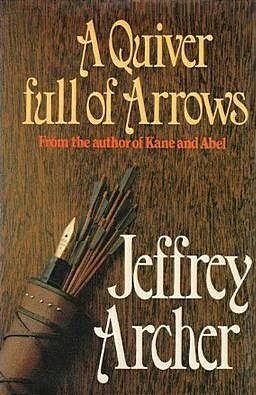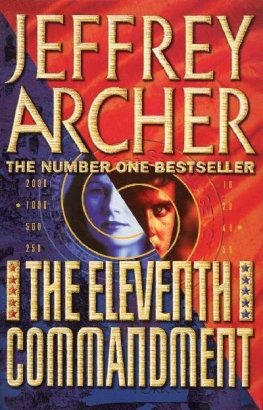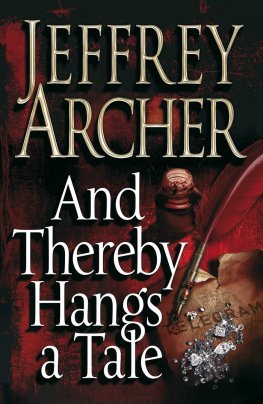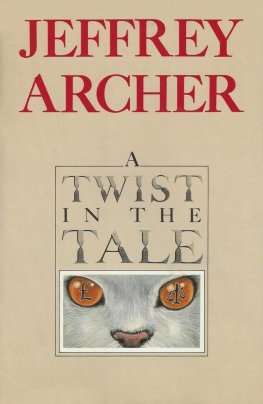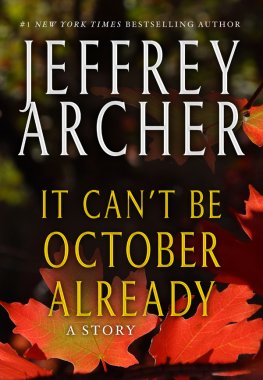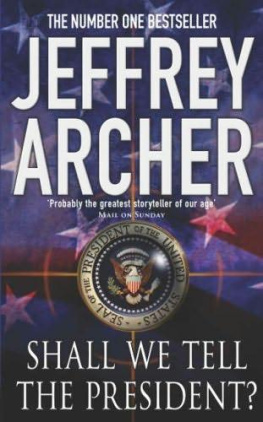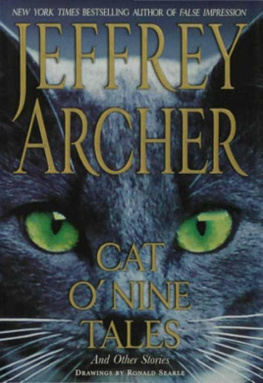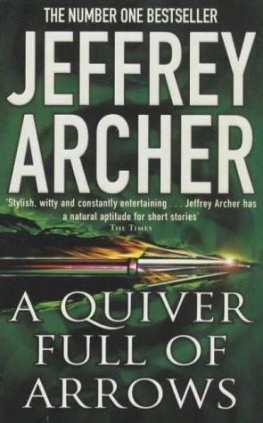Jeffrey Archer
A Quiver Full of Arrows
Of these eleven short stories, ten are based on known incidents (some embellished with considerable license). Only one is totally the result of my own imagination.
In the case of The Century I took my theme from three different cricket matches. Lovers of Wisden will have to do some considerable delving to uncover them.
The Luncheon was inspired by W. Somerset Maugham.
J. A.
The little Chinese statue was the next item to come under the auctioneers hammer. Lot 103 caused those quiet murmurings that always precede the sale of a masterpiece. The auctioneers assistant held up the delicate piece of ivory for the packed audience to admire while the auctioneer glanced around the room to be sure he knew where the serious bidders were seated. I studied my catalogue and read the detailed description of the piece, and what was known of its history.
The statue had been purchased in Ha Li Chuan in 1871 and was referred to as what Sothebys quaintly described as the property of a gentleman, usually meaning that some member of the aristocracy did not wish to admit that he was having to sell off one of the family heirlooms. I wondered if that was the case on this occasion and decided to do some research to discover what had caused the little Chinese statue to find its way into the auction rooms on that Thursday morning more than one hundred years later.
Lot Number 103, declared the auctioneer. What am I bid for this magnificent example of...?
Sir Alexander Heathcote, as well as being a gentleman, was an exact man. He was exactly six feet three and a quarter inches tall, rose at seven oclock every morning, joined his wife at breakfast to eat one boiled egg cooked for precisely four minutes and two pieces of toast with one spoonful of Coopers marmalade and drink one cup of China tea. He would then take a hackney carriage from his flat in Cadogan Gardens at exactly eight-twenty and arrive at the Foreign Office at promptly eight fifty-nine, to return home again on the stroke of six oclock.
Sir Alexander had been exact from an early age, as became the only son of a general. But unlike his father, he chose to serve his Queen in the diplomatic service, another exacting calling. He progressed from a shared desk at the Foreign Office in Whitehall to third secretary in Calcutta, to second secretary in Vienna, to first secretary in Rome, to Deputy Ambassador in Washington, and finally to minister in Peking. He was delighted when Mr. Gladstone invited him to represent the government in China, as he had for some considerable time taken more than an amateur interest in the art of the Ming dynasty. This crowning appointment in his distinguished career would afford him what until then he would have considered impossible an opportunity to observe in their natural habitat some of the great statues, paintings and drawings that he had previously been able to admire only in books.
When Sir Alexander arrived in Peking, after a journey by sea and land that took his party nearly two months, he presented his seals patent to the Empress Tzu-Hsi and a personal letter for her private reading from Queen Victoria. The Empress, dressed from head to toe in white and gold, received her new Ambassador in the throne room of the Imperial Palace. She read the letter from the British monarch while Sir Alexander remained standing to attention. Her Imperial Highness revealed nothing of its contents to the new minister, only wishing him a successful term of office in his appointment. She then moved her lips slightly up at the corners, which Sir Alexander judged correctly to mean that the audience had come to an end. As he was conducted back through the great halls of the Imperial Palace by a mandarin in the long court dress of black and gold, Sir Alexander walked as slowly as possible, taking in the magnificent collection of ivory and jade statues scattered casually around the building much in the way Cellini and Michelangelo today lie stacked against each other in Florence.
As his ministerial appointment was for only three years, Sir Alexander took no leave, preferring to use his time to put the Embassy behind him and travel on horseback into the outlying districts to learn more about the country and its people. On these trips he was always accompanied by a mandarin from the palace staff who acted as interpreter and guide.
On one such journey, passing through the muddy streets of a small village with but a few houses called Ha Li Chuan, a distance of some fifty miles from Peking, Sir Alexander chanced upon an old craftsmans working place. Leaving his servants, the minister dismounted from his horse and entered the ramshackle wooden workshop to admire the delicate pieces of ivory and jade that crammed the shelves from floor to ceiling. Although modern, the pieces were superbly executed by an experienced craftsman and the minister entered the little hut with the thought of acquiring a small memento of his journey. Once in the shop he could hardly move in any direction for fear of knocking something over. The building had not been designed for a six-foot-three-and-a-quarter visitor. Sir Alexander stood still, quite enthralled, taking in the fine scented jasmine smell that hung in the air.
An old craftsman bustled forward in a long blue coolie robe and flat black hat to greet him; a jet-black plaited pigtail fell down his back. He bowed very low and then looked up at the giant from England. The minister returned the bow while the mandarin explained who Sir Alexander was and his desire to be allowed to look at the work of the craftsman. The old man was nodding his agreement even before the mandarin had come to the end of his request. For over an hour the minister sighed and chuckled as he studied many of the pieces with admiration and finally returned to the old man to praise his skill. The craftsman bowed once again and his shy smile revealed no teeth but only genuine pleasure at Sir Alexanders compliments. Pointing a finger to the back of the shop, he beckoned the two important visitors to follow him. They did so and entered a veritable Aladdins cave, with row upon row of beautiful miniature emperors and classical figures. The minister could have happily settled down in the orgy of ivory for at least a week. Sir Alexander and the craftsman chatted away to each other through the interpreter, and the ministers love and knowledge of the Ming dynasty was soon revealed. The little craftsmans face lit up with this discovery and he turned to the mandarin and in a hushed voice made a request. The mandarin nodded his agreement and translated.
I have, Your Excellency, a piece of Ming myself that you might care to see. A statue that has been in my family for over seven generations.
I should be honored, said the minister.
It is I who would be honored, Your Excellency, said the little man, who thereupon scampered out of the back door, nearly falling over a stray dog, and on to an old peasant house a few yards behind the workshop. The minister and the mandarin remained in the back room, for Sir Alexander knew that the old man would never have considered inviting an honored guest into his humble home until they had known each other for many years, and only then after he had been invited to Sir Alexanders home first. A few minutes passed before the little blue figure came trotting back, pigtail bouncing up and down on his shoulders. He was now clinging to something that, from the very way he held it close to his chest, had to be a treasure. The craftsman passed the piece over for the minister to study. Sir Alexanders mouth opened wide and he could not hide his excitement. The little statue, no more than six inches in height, was of the Emperor Kung and as fine an example of Ming as the minister had ever seen. Sir Alexander felt confident that the maker was the great Pen Q, who had been patronized by the Emperor, so that the date must have been around the turn of the fifteenth century. The statues only blemish was that the ivory base on which such pieces usually rest was missing, and a small stick protruded from the bottom of the imperial robes; but in the eyes of Sir Alexander nothing could detract from its overall beauty. Although the craftsmans lips did not move, his eyes glowed with the pleasure his guest evinced as he studied the ivory Emperor.

